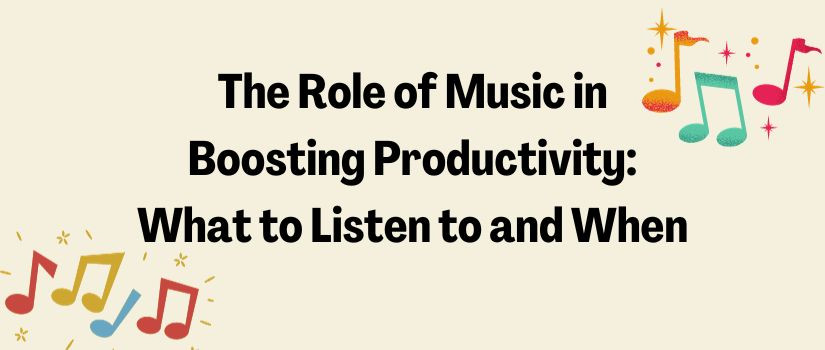
When it comes to boosting productivity, music can be a powerful tool that can help you stay focused and motivated. However, not all music is created equal, and the type of music you listen to can have a significant impact on your productivity.
For tasks that require concentration and focus, such as writing or problem-solving, it's best to listen to instrumental music or music with minimal lyrics. This can help avoid distractions and keep your mind on the task at hand. According to research, classical music is particularly effective in improving cognitive performance and enhancing concentration levels.
On the other hand, for tasks that require repetitive work, such as data entry or filling out forms, music with lyrics can be helpful in keeping you motivated and energized. According to a study published in the Journal of Consumer Research, people who listened to upbeat music while performing a repetitive task worked faster and more accurately than those who worked in silence.
In addition, music can also help reduce stress and anxiety, which can help improve productivity. Listening to relaxing music can help you stay calm and focused, allowing you to work more efficiently. Nature sounds and ambient music are particularly effective in promoting relaxation and reducing stress.
It's worth noting that not everyone finds music helpful for productivity. Some people may find it distracting or prefer to work in silence. Therefore, it's essential to experiment and find what works best for you. Try different types of music and see how they affect your productivity and focus. With the right music, you can supercharge your productivity and get more done in less time.



Ayush Bhargav
Positive Vibes Only
Music indeed has a unique influence on our productivity, but there are several fresh perspectives and considerations to explore beyond its direct impact on cognitive functions. When choosing the right tunes for work or study, personal preference plays a crucial role, and the psychological effects of music can be quite nuanced.
Personalized Music Selection
One key aspect of using music effectively is understanding personal music preferences and how they align with your mood and the task at hand. For some, a jazz playlist might enhance concentration, while for others, techno beats might be the key to sustained focus. It's essential to recognize that there isn't a one-size-fits-all music playlist for productivity—what motivates one person might distract another.
Creating a Music Routine
Building a routine around music can also significantly enhance productivity. For instance, starting your day with a specific energizing playlist can signal to your brain that it's time to focus. Similarly, playing a particular song or genre as a cue for breaks can help structure your workday more effectively, making you more disciplined and efficient.
Music as a Reward System
Music can also be used as a form of reward, which can boost motivation. After completing a challenging task or a significant period of intense focus, allowing yourself to listen to a favorite song or artist can be a great incentive. This not only breaks monotony but also makes the work experience more enjoyable and rewarding.
Cultural and Emotional Impact
The cultural background of the music can also play a role in how it affects productivity. Music from one's own cultural background might evoke feelings of comfort or nostalgia, potentially increasing satisfaction and focus. Conversely, exploring music from different cultures can provide a fresh auditory environment that might inspire creativity and new ideas.
Psychological and Emotional States
It's also worth considering the psychological states that music can induce. For example, some pieces might trigger memories or emotions that aren't conducive to productivity. It’s important to choose music that helps maintain a positive and balanced emotional state, which in turn can enhance cognitive functions and concentration.
Environmental Considerations
The volume and environment in which music is played can affect its impact on productivity. Soft background music might enhance concentration, while louder volumes could be useful in masking distracting noises in a bustling environment. Thus, adjusting the volume to suit the nature of the task and the workspace is crucial.
Exploring Silence
Finally, exploring periods of silence can be just as important as choosing the right type of music. Silence can sometimes provide the best environment for deep thought and creativity, especially for those tasks that require high levels of cognitive engagement or creative thinking.